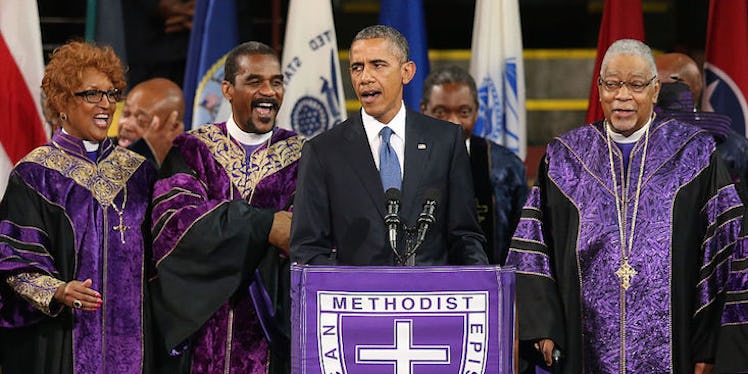
Obama's Speechwriter Describes "Most Hopeful Days" In Politics On Their Anniversary
President Barack Obama's speechwriter, Cody Keenan, wanted to remind the world of some hope in politics.
In politics, there are good weeks and bad. There are quiet weeks, and there are weeks where it seems like the sky is falling. This is a sky-is-falling week, and it's only Monday.
Today, June 26, the Supreme Court, on its last day of the current term, has decided to uphold much of Trump's travel ban, which was previously struck down by lower courts, until they can rule on the case in the fall.
The ban "may not be enforced against foreign nationals who have a credible claim of a bona fide relationship with a person or entity in the United States," and SCOTUS will rule on the case once their session begins in the fall.
SCOTUS also ruled in favor of a Missouri parochial school on a controversial case in which the school applied for a government-funded grant to improve their playground. This case could create a precedent for religiously-affiliated schools to start using government funds in the future, blurring the line between church and state.
Finally, SCOTUS decided that they will, in the fall, hear an appeal from a Colorado baker who refused to make a cake for a gay couple on the grounds that it would violate his religious beliefs.
Any day with just one of these decisions would be troubling. This day is downright heartbreaking.
But one former Obama staffer, Keenan, took to Twitter to celebrate the two-year anniversary of what he considers the "10 most hopeful days" he had ever seen in politics.
He wanted to remind those who may be struggling today that those days started "in the darkest way imaginable."
It's a must-read for anyone struggling to deal with the twin gut-punches of the upheld travel ban and the shaky ground upon which separation of church and state and LGBTQ+ rights stand.
This period of time began with the Charleston shooting, a tragedy in which a white supremacist gunned down nine people at Emanuel African Methodist Episcopal Church in Charleston, South Carolina, in hopes of starting a race war.
President Obama was asked to eulogize the victims. "He'd done a dozen of these already, and I was short on ideas," Keenan writes.
Then, Keenan recalls, the families of the victims displayed absolute grace for the killer, and that changed everything:
Obama decided that he wanted to discuss "the concept of unearned grace" in his eulogy. The shooting also led former South Carolina Governor Nikki Haley to call for the removal of the Confederate flag from the grounds of the State House, Keenan points out.
The grace displayed by victims' families and the outpouring of national support for Emanuel AME was not the only thing that Keenan took heart from. During SCOTUS Week -- the period of time in which the Supreme Court can rule on anything without alerting the White House -- the court handed down not one, but two historical decisions:
First, the Affordable Care Act (ACA, aka Obamacare) was upheld.
Keenan quoted Obama's statement on the matter:
Then, the next day, marriage equality was upheld by the highest court of the land. Huge, Keenan says. So big he couldn't concentrate.
Again, Keenan turns to Obama's statement on the ruling, because who better to sum up the powerful speech than the master orator himself?
Reading these words -- that progress is made in slow increments, that it is the people who must fight for these watershed moments, that "ordinary people can do extraordinary things" -- is a salve for the hurt caused by days like today, when a government body so large, so seemingly distant, can make positive change seem impossible.
Finally, Keenan reaches the end of this historical period in time: the famous eulogy Obama made for the victims of the Charleston shooting.
Throughout this week, Keenan says, he and Obama worked on the eulogy, and the president wrote and rewrote whole sections as these court decisions were handed down.
"That's what I felt this week: an open heart," Obama famously said. "That, more than any particular policy or analysis is what's called upon right now, I think."
Only two years ago, Keenan reminds us. This all took place two years ago.
For many, this seems a different country entirely -- with an administration that has faced criticism for policies around Muslim people, the LGBTQ+ community, and immigrants, as well as for its handling of the attempted dismantling of the Affordable Healthcare Act that would put an estimated 22 million out of insurance.
But Keenan is decidedly more optimistic about the future:
"Americans are still hopeful, compassionate, brave, and forward-looking," Keenan tweeted. "You see it all the time. We are still in charge of our own fate." Take heart, he continues, because he thinks about that period of time often when he sees the level of civic engagement and resistance.
There seems to be a cruel symmetry to 2017's SCOTUS Week, but if Keenan's thread can teach us anything, it's that the fight must keep going.